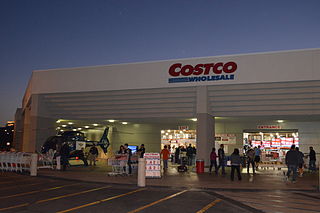Source: Wikimedia Commons - Nandaro
By now it's well understood that the unusually harsh winter weather over the past six months took its toll. Retail sales suffered during both the critical holiday shopping season and, to a lesser extent, the first quarter. For evidence of this, look no further than the most recent sales reports from Wal-Mart Stores (WMT 1.32%), the biggest retailer in the world, and Target (TGT -0.70%).
However, not all discount retailers are struggling. Costco Wholesale (COST 0.17%) is still generating satisfactory growth. It didn't just survive the ugly winter weather, it thrived. Costco has managed to produce healthy same-store sales growth that far surpassed its competitors in the discount-retail space. Meanwhile, its share price has barely budged over this time period. That means it's looking like a great buying opportunity.
Performance speaks for itself
While most other retailers saw falling traffic and stagnating sales this holiday shopping season, Costco was a notable exception. This period is crucial for discount retailers since consumers in America do a lot more shopping in the fourth quarter.
Over the past six months, Costco's U.S. same-store sales, which measure sales at locations open at least one year, rose 4%. Total worldwide sales rose just 3% in this period, but Costco's true performance is better than its headline numbers suggest. Negative impacts from gas-price declines and foreign currency exchange rates pressured sales. Excluding these effects, Costco's total same-store sales increased 5% in the most recent quarter and over the past six months.
By contrast, Wal-Mart saw comparable-store traffic decline by nearly 2% in the most recent quarter. This resulted in U.S. same-store sales dropping by 0.4% in the period. However, it's not just the U.S. that is looking like a problem for Wal-Mart; international markets aren't doing great either. After its most recent quarterly results, Wal-Mart revealed it would close 54 underperforming stores in Brazil and China, two premier emerging markets.
Meanwhile, Target is still grappling with a security issue that resulted in as many as 70 million shoppers having their personal information stolen. Hackers obtained data including payment card numbers, names, mailing addresses, phone numbers, and email addresses. Target's U.S. same-store sales fell by 2.5% in the fourth quarter. Comparable-store sales also fell in fiscal 2014.
Don't be scared by valuation
One thing about Costco that might concern investors is that it trades for a fairly lofty valuation. Today, shares of Costco exchange hands for about 25 times trailing earnings and 21 times forward earnings. Because of this, investors may instead flock toward Wal-Mart or Target, both of which are relatively cheaper. Indeed, Wal-Mart and Target trade for forward P/E multiples of 13 and 12, respectively.
However, investors shouldn't be concerned about Costco's valuation. It's more expensive on a P/E basis than its two closest competitors, but Wal-Mart and Target are cheaper for good reason. Wal-Mart's store closures in Brazil and China signal trouble in the emerging markets, and the retailer is simply not drawing as many customers through its doors as before. This is reflected in the fact that its first-quarter earnings are expected to be flat year over year.
Meanwhile, Target is hoping its Canadian push will restore sales growth, although that remains to be seen. Target Canada woefully under-performed last year. Canadian stores posted a $941 million loss before interest and taxes in the period. And there's reason to suspect that Target's brand and consumer connection were weakened at least somewhat by its massive security breach.
The Foolish bottom line
It's far from a perfect operating environment for discount retailers in the United States right now. The economic recovery from the worst recession in decades is frustratingly slow. And the unusually harsh winter weather took a bite out of fourth-quarter sales, which should have been a time of strength. However, Costco is rising above its competitors to post solid results even with the aforementioned headwinds.
It's true that Costco's stock is more expensive on a valuation basis than Wal-Mart and Target, but deservedly so. Costco is doing much better than its closest rivals and has a brighter forecast ahead.





